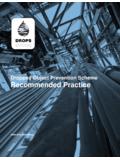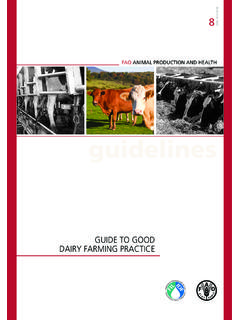Transcription of RECOMMENDED PRACTICES ON COMPETITION …
1 1 RECOMMENDED PRACTICES ON COMPETITION assessment A primary goal of COMPETITION agencies is to promote competitive markets and thereby protect consumers. Most COMPETITION agencies do this through at least two mechanisms: enforcement and advocacy. COMPETITION advocacy refers to those activities conducted by the COMPETITION agency related to the promotion of a competitive environment for economic activities by means of non-enforcement mechanisms, mainly through its relationships with other government bodies and by increasing public awareness of the benefits of The goal of COMPETITION advocacy is to enhance understanding of the competitive process and provide a framework for thinking about public policy issues from a COMPETITION perspective.
2 A significant part of many COMPETITION agencies advocacy activities is dedicated to addressing public restraints on COMPETITION . Many COMPETITION agencies do this by offering input on proposed or existing legislation, regulations, or policies so as to prevent unnecessary restrictions that hinder COMPETITION on the merits and adversely impact price, quality, innovation, or consumer choice. Recognizing that legislation, regulations, and policies ( policy or policies ) may restrict COMPETITION , including inadvertently, COMPETITION agencies can help policymakers as they evaluate the impact of a policy.
3 For example, a proposed law seeking to address a specific policy goal such as consumer protection or environmental concerns may have unnecessary, disproportionate, or unanticipated adverse effects on COMPETITION . The adverse impact is more likely where policies impose specific limits on price, quantity, or quality, limit market entry or exit, or interfere with innovation. COMPETITION agencies can help identify the costs to COMPETITION of a particular proposal and make specific recommendations to help mitigate these costs that the policymaker can take into account when assessing the overall goals of the policies under review.
4 Thus, a COMPETITION assessment occurs when, either at a policymakers request, or of its own initiative, a COMPETITION agency or another government body evaluates the competitive effects of a proposed or existing policy. Through the COMPETITION assessment , COMPETITION agencies can urge policymakers to consider the policy s likely impact on COMPETITION , identify whether justifications exist for any restrictions on COMPETITION , and assess whether less restrictive alternatives would achieve the intended public policy goal. By offering policymakers expertise regarding the potential costs of restrictions on COMPETITION , COMPETITION agencies raise awareness among policymakers and elevate COMPETITION as a consideration alongside other public policy goals.
5 COMPETITION assessments can take many forms, ranging from recommendations supported by general economic theory to the more resource-intensive COMPETITION impact assessments, with many variations in between. The different ways of conducting a COMPETITION assessment of 1 Definition of advocacy from the 2002 ICN advocacy report, Advocacy and COMPETITION Policy at 1. Available at: 2 proposed or existing policies can themselves constitute advocacies, as well as provide a foundation for or input into later advocacies.
6 These RECOMMENDED PRACTICES are intended to provide guidance to COMPETITION agencies on the COMPETITION assessment process, and do not require COMPETITION agencies to engage in COMPETITION assessment , including as related to any particular case or Although the RECOMMENDED PRACTICES are addressed to COMPETITION agencies, it is recognized that other government bodies can carry out valuable COMPETITION assessment work. General Framework for COMPETITION assessment I. A COMPETITION assessment should include the identification of a proposed or existing policy that may unduly restrict COMPETITION and an evaluation of its likely impact on COMPETITION .
7 Comment 1: A COMPETITION assessment is a review that identifies proposed or existing or policies that may unduly restrict COMPETITION and evaluates the policy s likely impact on COMPETITION . It can be conducted by the COMPETITION agency or another government body. The evaluation is often based on general economic principles, but can also be based on existing studies, enforcement experience, or even, in some cases, on new empirical work such as a quantification of the costs of the policy. The assessment of competitive effects is used to urge policymakers to consider the policy s likely impact on COMPETITION in deciding whether the policy is appropriate.
8 Comment 2: COMPETITION assessments should be incorporated in the review of public policies in an efficient and effective manner, consistent with institutional and resource constraints. Comment 3: Where possible, a COMPETITION assessment should include suggestions for alternative approaches to achieve the policy goals while reducing restrictions on COMPETITION . Comment 4: Policymakers readiness to accept recommendations may be considered in deciding whether a COMPETITION assessment is appropriate. Comment 5: While proposed policies are often the focus of COMPETITION assessments, existing policies also are appropriate targets for COMPETITION assessments.
9 Such an assessment allows for the consideration of actual effects and incentives that have resulted from the implementation of these policies. It may be initiated by the COMPETITION agency, another government body, or policymakers. Comment 6: COMPETITION assessment of existing policies can build on sunset clauses (a provision that a law or regulation will expire on a particular date, unless it is reauthorized, or on a statutory requirement to assess the overall impact of legislation or regulation after a certain period). In some jurisdictions, a specific body within government, the legislature, or other 2 The OECD s extensive work on COMPETITION assessment , including the OECD Council Recommendation on COMPETITION assessment and the OECD COMPETITION assessment Toolkit, is an important complement to these RECOMMENDED PRACTICES .
10 Available at: 3 bodies may be tasked with defining priorities for the review of existing public policies. Such an assessment may also be undertaken as part of a broader assessment of public policies. Creating an Enabling Environment for COMPETITION assessment II. COMPETITION agencies should advocate for a policymaking environment that promotes consideration of COMPETITION principles. Comment 1: As part of their COMPETITION advocacy mission, COMPETITION agencies should seek to persuade policymakers to create an institutional environment that facilitates COMPETITION input into decision-making.

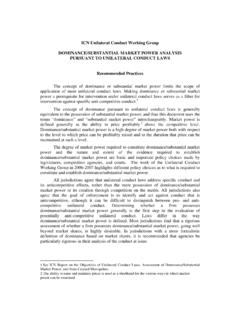
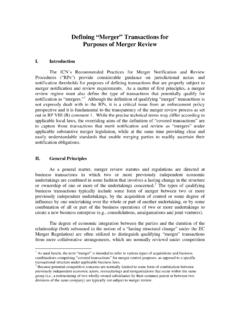
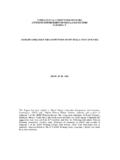



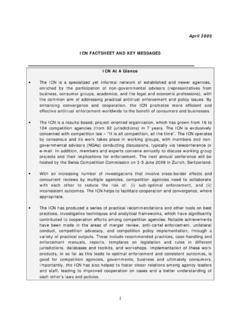
![[MERGER NOTIFICATION PROCEDURE TEMPLATE]](/cache/preview/4/4/e/2/5/9/d/c/thumb-44e259dc3896a9580aeac27f113f9044.jpg)

